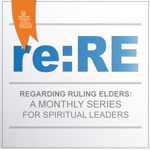When our daughter and son were young, as we tucked them in at night, I would make the sign of the cross on their foreheads. I wanted them to know that they were sealed in Christ.
Many years later, during my ordination service as a teaching elder, our daughter, speaking with our son by her side, shared about that bedtime ritual of their childhood. And then she made the sign of the cross on my forehead, with these words:
“[My full name], child of the covenant,
“I sign you with the cross
“that you may remember your baptism
“and be thankful.”
I don’t know if this simple ritual was a part of your ordination as a ruling elder or not, but I want to remind you that you are a child of the covenant—sealed in Christ, sheltered in God’s love, blessed with the Spirit.
And in these complex and challenging days, I call us all back to a profound innocence as children of the covenant. A free, faithful, and focused innocence.
Sometimes innocence is more powerful than we think.
This year, the documentary film, Weapons of the Spirit, is being reissued. It is about a village in south-central France called, Le Chambon-sur-Lignon, populated primarily by Protestants who are descendants of French Huguenots. During World War II, the people of this small village saved up to 5,000 Jews. Most of them were children.
In his description of the film, in the book, The Word Before the Powers: An Ethic of Preaching (Westminster John Knox Press, 2002), Presbyterian minister and professor, Charles Campbell, describes not only the courage of these people, but an intriguing innocence about them. The interviewer and filmmaker is Pierre Sauvage, a Jew, who himself was born and sheltered as a baby in Le Chambon during the war. He asks these villagers how they came to make such a risky decision. And the villagers look puzzled, and reply with comments such as:
“It happened so naturally, we can’t understand the fuss.”
“It happened quite simply … I helped simply because they needed to be helped.”
“The Bible says to feed the hungry, to visit the sick. It’s a normal thing to do.”
When asked why they continued to help even after the situation became more dangerous, one woman replied, simply, “I don’t know. We were used to it.” These brave Christians were doing what came naturally to them through their faith—feeding the hungry, caring for the least of these, providing hospitality to the sojourners in their village.
Powerful innocence, self-giving love—and focus.
It is not an easy time to be a Christian, let alone a leader in Christ’s church. But that is what we are called to be. And since ruling elders in our denomination are ordained to the denomination as a whole, for their lifetimes, we need a way to live and lead well over the long run. We need this simple, deep focus, this innocence that can take the world—and us—by surprise.
And we only find it by utter trust in God—if only for this moment, this day, this week.
As the Psalmist writes:
But I have calmed and quieted my soul,
like a weaned child with its mother;
my soul is like the weaned child that is with me.
O Israel, hope in the Lord
from this time on and forevermore. (Ps. 131:2–3, NRSV)
What kind of activities or quieter moments allow you to feel at peace in God?
Are there risky steps to which God is calling you now for the sake of God’s kingdom—in your church, your work, your life, or your community?
The Reverend Dr. Diana Nishita Cheifetz is a spiritual director, serving lay leaders and clergy in the San Francisco Bay area, the U.S.A., and internationally. Her website is www.spiritualdirectionforpastors.com.
For more about the information provided here, please contact Martha Miller at martha.miller@pcusa.org and browse the Ruling Elders website.

